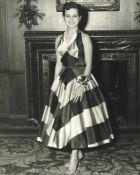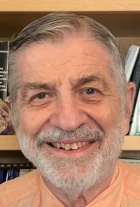Classnotes - 1960s
Algirdas Gamziukas, MD ’60 writes,
“I have been retired from practice since 1989. I have had a medical directorship at St. Joseph’s Hospital since 2000. We continued traveling. We have visited 89 countries, but will not make the century club (100 countries) because of Covid.
I think occasionally of our younger days, of Riggio, Hammel and Moreland. They interned with Donius and me. Tuyn is frequently in my thoughts. He was my partner for many years.
Helaine and I brought up two daughters and a son, MBAs, not MDs.
Bistany taught me sailing. We spent many days and weeks with wind and wave. A few years ago I sold the boat. It was a sad day.”
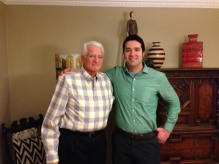
Thomas Guttuso, Sr., MD ’60, Clinical Professor of Ophthalmology, Vice President, Medical Alumni Association, and former Dean of Admissions, spent quality time with his scholar, Tim Buckley, MD ’10, over the holidays. Guttuso and Buckley enjoyed catching up over dessert with the Guttuso family. After completing his medical degree and residency at UB, Buckley moved to Chicago, where he is a board certified family physician at Heartland Health Centers.
Irwin Steinberg, MD ’60 writes,
“I am about to celebrate my 86th birthday. I am currently rehabbing a fracture of my right hip which I broke in a freak accident three months ago. Hopefully I should be good to go in another three months.
Otherwise, I am in reasonably good health.
Maxine just celebrated her 85th birthday.
I am still, successfully competing in Fantasy Football (21 years, six wins) as my main hobby at this stage of retirement. Nothing else is new; at this stage of life, probably just as well.”
Howard J Klein, MD ’60, writes,
“Patients are people, treat them well and politely.
P.S. I have 28 holes-in-one (golf). Can anyone top that?”
Gerald Saks, MD ’60, writes,
“I practiced general pediatrics in Riverside, California for over 50 years. Along with my wife, we created and implemented programs to benefit children in our local area. While in private practice I worked with several school districts and continued this work after retiring. I volunteer on a Student Study Team providing support to at-risk children and families.
I have such fond memories of friends at UB; I am sorry to see the names of those who have passed.
I appreciate and want to thank Roger Dayer, Marshall Lichtman, and Jennifer Britton who have put this together as I know I would not be able to travel to Buffalo for a 65-year reunion.”
Sylvia Sussman, MD '60 writes,
"September 1956, my whole life changed. I wandered up the stairs at Main and Bailey and became a medical student, not only a wife and mother of three children but someone different and have continued on that path for many years. In 1960, I graduated and life changed again. My first year was as a was as a medical intern at the “Meyer,” that my small family made another big change. We moved to Baltimore, MD to become a medical resident for one year, then switched my specialty to Anesthesia so I could have a scheduled time to work. I stayed at Sinai Hospital in Baltimore throughout my training with the rotations at Children’s Hospital in Philadelphia. And NIH for specialties. I was an anesthesiologist fir ten years in Baltimore, then we moved again, back to our hometown, Allentown, PA. I became an anesthesiologist at Sacred Heart Hospital there, the last years a department chief. We lived in Allentown for forty years. Then a reversal of our path. We followed the children – they had settled in Massachusetts first in New Haven and now in Worcestor, multiplying on the way. Our son is a pathologist, a grandson is a physiatrist, a granddaughter is a nurse practitioner, a son-in-law is hospitalist, a granddaughter is a speech pathologist, and another a school psychologist. We have six grandchildren and so far, eight great-grandchildren who live within visiting distance. Ben and I stayed together until just before our 71st anniversary. That’s it. From a retired friend. Thank you for your kindness to me as a student, you were really kind."
Michael Cohen, MD '61 writes, "Medical School: Evelyn Schaefer Award; AOA Professor of Neurology and Pediatrics, SUNY Buffalo.
Neurology training: Cleveland, Boston
US Army: 1966-68
Neurology Chair: 1983 -2000
President, Child Neurology Society, 1995-97, President Child Neurology Division AAN, President, Association of Child Neurology, Professors Membership AAN, ANA Chair, Medical School Alumni Counsel, Chair of SUNY/BFLO Faculty Senate
Over 100 published articles, 40 book chapters, and 4 co-authored books
Distinguished Medical School Alumni Award 2003
Member of the Presidential and Provost Search Committee
Retired 7/1/2017
friendships made and kept
married my sophomore year
First child, 1961, my year of graduation
Opportunities the degree provided:
getting to know and appreciate Harold Brody
Affiliation: organizer of moot court featuring law students both as defense and prosecuting lawyers and medical students as expert witnesses. The trial was held downtown and presided over by a retired Supreme Court judge.

Virginia V. Weldon, MD ’62, received an honorary doctor of science degree from Washington University in St. Louis at its commencement ceremony in May 2017.
After earning her medical degree at UB in 1962, Weldon completed an internship and residency in pediatrics at The Johns Hopkins Hospital and remained for a fellowship in pediatric endocrinology at The Johns Hopkins University School of Medicine.
Weldon joined the Washington University School of Medicine faculty as an instructor of pediatrics in 1968 and quickly rose through the ranks to become a professor of pediatrics and serve in a number of leadership positions.
She treated many children with diabetes and received national recognition for her research on a growth hormone deficiency in children that results in extreme short stature. Her research included investigating whether animal growth hormones were as effective as human growth hormones.
Weldon took on significant administrative duties at the School of Medicine, including serving as assistant to the vice chancellor for medical affairs from 1977 to 1981 and associate vice chancellor for medical affairs from 1981 to 1983. She served six years as deputy vice chancellor for medical affairs from 1983 to 1989 and was vice president of the Washington University Medical Center from 1980 to 1989.
Weldon left Washington University in 1989 to become vice president of scientific affairs at the Monsanto Company, where she addressed public policy issues affecting the company and its products. She retired from Monsanto in 1998 as senior vice president for public policy.
She returned to the university in 1998 to serve for one year as director of the Center for the Study of American Business, now called the Weidenbaum Center on the Economy, Government, and Public Policy. Nationally recognized for her leadership on medical education and biomedical research issues, Weldon held many national advisory positions, including on the President’s Committee of Advisors on Science and Technology under Bill Clinton.
She was also appointed by the U.S. Secretary of Agriculture in 1999 to the National Advisory Committee on Agricultural Biotechnology. In addition, she played a role in establishing the Supporters of Agricultural Research Foundation, a national organization that addresses issues of world hunger.
In 1985, Weldon became the first woman to chair the Association of American Medical Colleges.
Among her many honors, she was elected to the National Academy of Medicine of the National Academy of Sciences and named a fellow of the American Association for the Advancement of Science and of the American Academy of Pediatrics.
Weldon and her husband, Francis Austin, live in St. Louis. She has two daughters, Ann Weldon Doyle and Susan Weldon Erlinger, two granddaughters and a grandson.
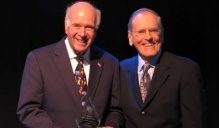
Barry Weinstein, MD ’69, Amherst town supervisor, presenting Philip Morey, MD ’62, with award from the Amherst Arts Board.
On May 13, 2014, Philip D. Morey, MD ’62, received the first annual Individual Supporter Award from the Town of Amherst’s Arts and Culture in Public Places Board. Earlier in the year, the board created a program to celebrate individuals who contribute to the arts in the community. Morey was recognized for his leadership on the governing board of the Musicalfare Theatre and for chairing the “Songs for Tomorrow” campaign, which funded a major expansion of the theatre. He also served on committees related to board nominations, legal affairs, new sound and lighting equipment, playbill sales and landscaping. For 14 years, Morey and his wife, Colleen, have chaired the Musicalfare Gala, which raised more than a quarter of a million dollars, as reported in the May 7, 2014, issue of the Amherst Bee.
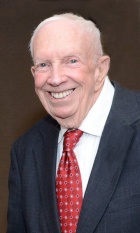
Morton E. Weichsel, Jr, MD ’62, recently wrote a letter to Evan Calkins, MD, pictured left, former chair of the Department of Medicine, in follow up to an article about Calkins that appeared in the summer 2013 issue of UB Medicine magazine.
The following are excerpts from Dr. Weichsel’s letter, which he would like to share with his fellow alumni.
Dear Dr. Calkins,
This is a much overdue letter to congratulate you on your outstanding and exemplary career.
But, as a member of the 1962 medical class, I have another agenda. As I recall, in the early fall of 1960, I started my first rotation as a student on the internal medicine wards at the Buffalo General Hospital, and to the best of my recollection, I was the very first UB medical student to present a case to you, the new professor of medicine who had come from Harvard. I got my patient, a lady with discoid lupus, at about 10:30 pm the night before and upon finishing the workup, the library was closed and I found, after a frantic search, a copy of Dr. Cecil’s textbook of medicine. It contained only a couple of short paragraphs on that subject. After a few hours sleep, I presented the case to you on ward rounds, and I will never forget how I botched it! I remember feeling depressed and humiliated that I had such a poor job at representing my medical class of some 73 students.
You were calm and patient and extraordinarily kind, as you asked me what I knew of Dr. Cecil, which of course was little or nothing! You reminded me of the lag time of getting new information into a textbook. I felt very appreciative of the way you handled my disastrous presentation, and have used it as an example for my own performance as an academic attending physician.
Again, I thank you for your thoughtfulness, which transcends the technical aspects of routine ward rounds...
With kindest regards, gratitude and fond memories, I wish you all the best.
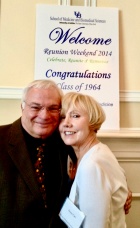
Jeffrey Carr, MD ’64, writes: “I am retired, and my wife, Diane, and I live in upper Westchester County, N.Y. Favorite memories: Leaving the hospital at day’s end with my closest alphabetical classmate, Seamus Carmody. Me: ‘It’s beautiful out.’ Him: ‘Good, leave it out.’ Also: lectures from O.P. Jones, and D.K. Miller.”
David J. Haas, PhD ’65
Video Presentation at iBiology on the IUCrJ Scientific Papers below:
- The Discovery of Macromolecular Cryocrystallography.
Dec (2019) NSF & NIH iBiology. https://www.ibiology.org/speakers/david-haas/. - Hampton Research Cryocrystallography History. https://hamptonresearch.com/blog-cryocrystallography-history-362.html.
- Why Macromolecular Cryocrystallography has been so successful. (2023). https://www.iucr.org/news/newsletter/volume-31/number-3/why-macromolecular-cryocrystallography-has-been-so-successful.
Biography
- Living History Biography by the American Crystallographic Association January (2016). https://history.amercrystalassn.org/h-david-haas.
- American Institute of Physics. Oral Interview (Sept. 2020). https://www.aip.org/history-programs/niels-bohr-library/oral-histories/45291.
- 2022 Haas, DJ. Six Methods of Inventing. Inventors Digest Magazine Sep 2022, 24-25. https://inventorsdigest.com/wp-content/uploads/2024/08/InventorsDigest-September2022-Full-Issue.pdf.
- 2021 Haas, DJ. The Invention of the Self-Expiring Visitor Badge March 4, 2021. Lemelson Center, Smithsonian Institution. https://invention.si.edu/invention-stories/invention-self-expiring-visitor-badge.
- 2021 Haas, DJ. The Two Inventors who made Airline Travel Safe May 10, 2021. Lemelson Center, Smithsonian Institution. https://invention.si.edu/invention-stories/two-inventors-who-made-airline-travel-safer.
Book
- "Personal Identification Modern Development and Security Implications." 2nd ed Taylor & Francis, 2024. https://www.routledge.com/Personal-Identification-Modern-Development-and-Security-Implications/Haas/p/book/9781032523712?srsltid=AfmBOopIORnboXAtA35amhWKcxMIor0GxwNeSMXGehko5zaA1-JS_URi.
Sanford Hoffman, MD ’65, an otolaryngologist, writes: “I’m presently practicing ENT part-time in Arizona. Originally I retired from active practice 20 years ago and helped run an international program with Millard Fillmore Hospital and hospitals in Ukraine. At the same time, I was president of the American Rhinological Society. I subsequently started a company in Boston to look at medical outcomes and also was an executive vice president for IPA WNY before finally moving to Scottsdale, AZ. I missed patient care, so 11 years ago I went back to part-time practice.
I’ve been happily married to my sweetheart, Beth, for 50 years. We have two children and four grandkids."
Gary Jeffery, MD ’65, writes: “I retired from eye practice in Batavia, NY, four years ago and retired about 15 years ago after many years of organizing the Christian Medical and Dental Association chapter in WNY. Now my wife and I travel to northern Virginia, Chicago and Portland, Oregon, as often as possible to visit our three kids and their families, including eight grandchildren. Our oldest daughter was in Buffalo this spring for her 25th UB Med School reunion! Both she and her husband practice pediatric ophthalmology. Our son is an adolescent psychiatrist, but knows enough adult psych to be indispensable for us all."
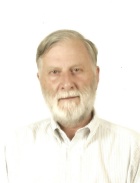
H. Elliott Larson, MD ’65, FRCP, FIDSA, is currently working in Kabul, Afghanistan, with Global Health Consulting regarding private hospital standards. Favorite memories: Intellectual stimulus of studying the basic sciences.
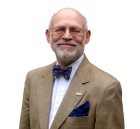
Lance Fogan, MD ’65, retired from neurology practice in southern California in 1997.
Currently, he teaches neurology and lead brain pathology conferences at the David Geffen School of Medicine at UCLA. In March 2013, he published a novel, titled Dings, about an eight-year-old boy diagnosed with epilepsy. The novel received a highly favorable review by Joseph I. Sirven, MD, editor-in-chief of the Epilepsy Foundation of America’s website, epilepsy.com. “Told in a realistic but page-turning manner, the book plays out as a medical mystery that finally reveals itself towards the end,” wrote Sirven. “By that time, the reader is left with the impression of how difficult it is for someone to be diagnosed with epilepsy and to take on the role of having to educate everyone around you when you are struggling as a parent and patient to grasp the situation.” Dings is available on Amazon.com.
James Moran, MD ’66, lives in Santa Monica, California. He is still in active clinical practice, affiliated with Providence St. John’s Health Center and serving as clinical professor of obstetrics and gynecology at USC’s School of Medicine. He has four children and six grandchildren.
Norman Berkowitz, MD '67 writes: "I have had a wonderful career and life after my residency at Mt. Sinai hospital NY. I was a Pediatrician in the airforce for two years. I got married after Med school and had three sons along the way. After the Airforce, I went into pediatric practice with a doc that I did my training with in Westchester County, NY. We had a great practice; I was in practice for 41 years and retired at age 72.5 years. As EMRs came in, it was the time to retire. My wife passed away in 2004. I have been fortunate to meet a wonderful woman after 10 years of dating. I HAVE FIVE GRANDCHILDREN. I will be 80 in April 2022. I am grateful for a wonderful life. I had a great career and a wonderful family and friends."
J. Brian Sheedy, MD ’67, is medical director of palliative care at Tallahassee Memorial Hospital. He retired from Hematology Oncology Associates of NW Florida in 2008 and helped to establish a palliative care consultation service at Tallahassee Memorial in 2009.
Favorite memories: Drs. Calkins, Nolan, Friedman, Genco, Bossman, Klocke, Sanes, Puleo. Classmates Venuto, Sheehan, Kelly, Menchini, Weiss, Gerstein, Goldfarb.
Leon Hoffman, MD ’67, who is on faculty at Icahn School of Medicine, recently published Manual of Regulation-Focused Psychotherapy for Children (RFP-C) with Externalizing Behaviors: A Psychodynamic, with co-authors Timothy Rice and Tracy Prout (Routledge Books).
Hoffman is director of the Pacella Parent Child Center, co-director of the Research Center at the New York Psychoanalytic Society Institute and chief psychiatrist at West End Day School, New York City.
Favorite memories: What a great group of classmates! Remember Professor Oliver P. Jones, professor of anatomy, ringing the bell in class on November, 22, 1963 and announcing : “Gentlemen the President is dead.” (There was a handful of women present.)
"November 22, 1963
Oliver P. Jones rang the bell
To call our attention
In anatomy class
On the Thursday before Thanksgiving
In Buffalo, New York.
Gentlemen
There were maybe four or five women
The President is dead
I looked at the cadaver lying prone
Imagining the President’s neck fifty-eight years ago.
I was going on twenty-two that fateful day
My mother intoned when I called, upset, Life will go on
My roommate went to a movie with his girlfriend
How could they?
In fifteen days my eightieth birthday
Will occur the day before the eightieth
Anniversary of the bombing of Pearl Harbor
Optimism is part my inner life
Despite pessimistic expressions
Life will go on
As my mother said
She led a very difficult life
Enduring traumas
Not as unspeakable as those who perished
Our lives
Our children’s lives
Our grandchildren’s lives
Our entire community
Hoping that the next eighty
Will bring joy and fulfillment
To all
Similar yet different
To that with which we were
Blessed."
-Leon Hoffman
November 21, 2021
Dedicated to:
Anne
Oliver P. Jones
Leon Farhi
S. Mouchly Small
Norman Sokoloff
Erwin Haas, MD '68, writes: "Second year physiology had great faculty and lectures but the one that we all remember was delivered by a Korean professor who was visiting. He been assigned to give us the two lectures on renal physiology.
He spoke slowly and was obviously very conscious of his accent and somewhat limited vocabulary; he had worked very hard on his talks, probably memorized large parts of it and it showed. Everyone in that room understood and loved the countercurrent multiplier when he finished.
There was a few moments of silence as the great effort and understanding of this man's lecture sank in, then our class spontaneously gave him at least a 5 minute standing ovation.
I have only a few other transcendent moments-falling in love with my wife of 47 years, of singing "we gotta get outta this place" with the crowd in the officers' club in Nya Trang, but that rush of feeling in a lecture hall brought on by a foreign doctor whose name is forgotten was an unexpected gift."
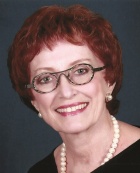
Ophthalmologist Moira J. Burke, MD ’69, received a Leading the Way Award from the University of South Florida (USF). She was recognized for her “inspiration, motivation and empowerment” at a luncheon held at USF in conjunction with National Women’s Health Week. A native of Buffalo, Burke earned her undergraduate degree from Vassar College prior to attending UB medical school. She completed her residency at Philadelphia’s Wills Eye Hospital.
In 1975, Burke entered private practice in north Tampa. In 2005, she joined the faculty at the USF Morsani College of Medicine, where she trained ophthalmology residents. For five consecutive years, she received USF’s Award for Excellence in Surgical Teaching. In the sixth year, the award was renamed in her honor.
In 1990, Burke joined the U.S. Air Force Reserve Medical Corps as a lieutenant colonel and was deployed during Desert Storm. She retired from clinical practice in 2015 and currently works part-time as medical director of Premier Eye Care.
She has two sons, Brendan and Ryan, and four grandchildren. She enjoys reading, knitting, walking, piano playing, and volunteering with the Literacy Advocacy Council, USF Women in Leadership and Philanthropy, and The Chiseler’s.
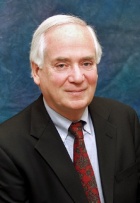
After completing the MD/PhD program at SUNY Buffalo in 1969 Bruce Rabin MD '69, joined the University of Pittsburgh School of Medicine and the University of Pittsburgh Medical Center and remained there until retiring in 2017. He says, "I was recruited to Pittsburgh to establish a Diagnostic Clinical Immunopathology Laboratory which brought together all patient immunology testing into a single site. Some personal highlights were establishing the joint MD/PhD program for the University of Pittsburgh and Carnegie Mellon University in 1987 and extensive teaching of clinical immunology to medical students and residents. For 40 years I led a major research program in psychoneuroimmunology and developed and implemented programs to help healthy people and those with immunologically mediated diseases increase their ability to cope with stress with significant clinical benefit. I continue to devote time to conducting stress coping programs throughout western Pennsylvania and, in addition, teaching in Osher programs. Unfortunately, the need to help people improve their ability to cope with stress is continually increasing. I have 3 grandchildren in Pittsburgh and 3 in Scottsdale Arizona. I’m enjoying spending some winter time in Scottsdale."
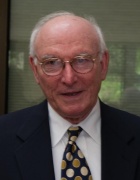
Harris M Kenner, MD '60
Harris M Kenner, MD, FACC, an esteemed cardiologist who practiced for nearly 60 years, passed away at home in Rockville, Maryland on December 23, 2022. He was 88.
A native of Elmira, New York, Harris was born to Max and Beatrice (Kantz) Kenner on January 13, 1934. After graduating from Elmira Free Academy, he attended the University of Rochester where he received his undergraduate degree in 1956. Upon completion of his medical curriculum at the University of Buffalo Medical School, Harris went on to become a much loved and highly respected cardiologist and continued to practice until shortly before his passing.
Harris completed his medical training at the Genesee Hospital in Rochester, New York, the Mayo Clinic in Rochester, Minnesota and the New England Center Hospital in Boston. Following a year in private practice in Toledo, Ohio, he joined the U.S. Public Health Service, where he served in Arlington, Virginia from 1966- 1968. He then resumed private practice in Bethesda, Maryland, later continuing in Chevy Chase, where he remained until his retirement.
Concurrent with his private practice, Harris was also active in academia and enjoyed serving the medical field in administrative and advisory capacities. From 1966-1974, he was a Clinical Instructor at The George Washington University School of Medicine. At Suburban Hospital in Bethesda, he was Director of the Coronary Care Unit from 1975-1980 and sat on the Board of Directors as Chairman of the Medical Staff from 1995-1997. He also served on the Board of the Montgomery County Heart Association and, for many years, regularly provided cardiology consulting services to the FBI and the U.S. Secret Service.
Harris loved his work and embraced all of his roles with dedication and enthusiasm. He took time to learn about his patients’ lives beyond the office visit and cared for many of them for decades. He was also a cherished colleague who took pleasure in providing guidance and support, and he greatly enjoyed working with his son, Michael, who also became a cardiologist and practiced alongside his father as he began his own career.
An avid reader with a deep appreciation for music and art, Harris also enjoyed sports and particularly looked forward to his annual ski trip to Snowmass, Colorado. The New York Yankees had no greater fan and, for many years, he could also be found in the bleachers at Washington Redskins (now Commanders) games.
Harris is survived by his devoted partner, Nancy O’Keefe, his daughters, Beth Kenner (Chris DeMassa) and Karen Friedman (Sandy), his son, Michael Kenner, and six grandchildren: Jodi, Laura, Tyler, Jason, Melissa and Kevin. In addition to his many years of dedication to medicine, Harris leaves a legacy of kindness, generosity, integrity, wisdom and compassion. He is deeply loved and profoundly missed.
Robert L. Malatesta, MD ’60
Robert L. Malatesta, MD ’60, a prominent obstetrician-gynecologist and medical educator, died Feb. 5, 2017 after a brief illness. He was 83.
Following graduation from UB’s medical school, Malatesta completed his residency in obstetrics and gynecological surgery at Buffalo General Hospital. He then joined the staff at Muhlenberg Hospital in Plainfield, N.J., his hometown, and started a private practice before serving in the Air Force during the Vietnam War. Upon returning to Plainfield, he gave up private practice to initiate and direct Muhlenberg’s residency program in OB/GYN. The program became the nucleus of the Rutgers Medical School residency, and he was named a clinical professor at the Rutgers Robert Wood Johnson Medical School.
A diplomate of the Board of OB/GYN and a fellow of the American College of OB/GYN, Malatesta served as Muhlenberg’s Chief of OB/GYN from 1973 to 1990. In 1984, he was elected president of the New Jersey OB/GYN Society.
A generous donor to the UB medical school, Malatesta joined his classmates in sponsoring the MD Class of ’60 Student Group Study Suite in the school’s new building on the Buffalo Niagara Medical Campus.
Surviving are his wife, Barbara; his son, Charles; his daughters, Nanette Saylor and Emily Kelton; and six grandchildren.
Kenneth E. Bell, MD ’61, a leader in family-centered obstetrical care and a dedicated advocate for the medically underserved, died on July 14, 2018, at age 82.
A native of New York City, NY, Bell graduated from the Bronx High School of Science and attended Washington and Jefferson College in Pennsylvania, where he earned a degree in history. Following graduation from the Jacobs School of Medicine and Biomedical Sciences in 1961, he completed his residency in obstetrics and gynecology at Kings County Hospital in Brooklyn, NY, where he was named chief resident.
He then enlisted as a captain in the air force and served for two years as head of OB/GYN at Hill Air Force Base in Utah. In 1968, Bell joined Southern California Permanente Medical Group at the Kaiser Permanente Medical Center in Bellflower, CA, where he was later named chief of OB/GYN. During this time, he held faculty positions at the University of California, Los Angeles, and the University of Southern California. In 1978, he moved to the newly opened Orange County Kaiser Permanente facility as chief of OB/GYN.
Bell was a driving force behind the first professional training program for OB/GYN nurse practitioners and midwives in Southern California. He brought the concept of family-centered obstetrical care to Kaiser Permanente, which became a model for hospitals worldwide. In 1988, he became the medical director for Orange County, CA.
In 2008, a street at the Kaiser Permanente Medical Center in Irvine, CA, was named “Ken Bell Boulevard.” The honor was bestowed because, as one of his colleagues at Kaiser Permanente said, “I can think of no one who is more responsible for what we are, or what we will become than Ken.”
After retiring from Kaiser in 2001, Bell continued to inspire and be a mentor in his role as chief medical officer of CalOptima, Medicaid Managed Care, which oversaw 300,000 of Orange County’s indigent and vulnerable population. Many called Bell “the father of CalOptima” for his extraordinary support for and innovation in delivering care to its members.
In 2007, he retired from CalOptima to become the chief medical officer for the Coalition of Orange County Community Clinics, a group of 17 clinics serving the uninsured and underinsured in Orange County.
Bell was the recipient of many awards, including the Orange County March of Dimes 1997 Mentor in Medicine Award and the Southern California Permanente Medical Group 2001 Physician’s Exceptional Contribution Award.
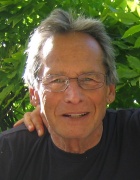
Stephen David Rader, MD ’61
Stephen Rader, MD ’61, a psychiatrist who practiced for many years in Contra Costa County, CA, (East Bay region of the San Francisco Bay Area) died November 1, 2020 surrounded by his family at his daughter’s home in Berkeley.
Rader touched countless lives through his work as a psychiatrist in county mental health, as a devoted friend and loving husband, father, grandfather and father figure to many.
A native of Brooklyn, New York, he attended James Madison High School and Lafayette College. While in medical school, he married Wilma Kaufman. After graduating, he served in the army as a medical officer with a tank battalion and was stationed in West Germany.
In the summer of 1965, Rader traveled to Selma, Alabama, with the Medical Committee for Human Rights to visit jails and hospitals in order to ensure that activists involved in voter registration received necessary medical care and were not abused by the authorities.
In 1967, the family moved to California, where, from 1967–1970, Rader served as a flight surgeon and psychiatrist at Travis Air Force Base. In 1970, the family moved to Berkeley.
Until his retirement at the age of 80 in 2014, Rader spent his career serving the community as a psychiatrist, first in private practice, and then in public mental health for more than 30 years. He most enjoyed the many years he spent at the Concord Adult Mental Health Clinic. His colleagues became a circle of close friends, and he discovered there his true calling in serving people who struggled with severe and persistent mental illness. Rader gave his personal cell phone number to his patients and would call them in the evenings himself to remind them of their scheduled appointments the next day. He twice won an award as Mental Health Provider of the Year in Contra Costa County, selected by mental health clients and their families. He was the first psychiatrist to receive this award. (The award has since been renamed The Stephen D. Rader Caring Physician Award.)
Rader was a deeply grateful person, and in this last year he often reflected aloud on the blessings and good fortune of his life. He is survived by his wife, Wilma, his children, Andrew (Shanna), Allison (David) and Jenn (Barb), his grandchildren, Kaija (Max), Leila, Nadov, Elijah and Ben along with loving sisters-in-law, nieces, a nephew and extended family.
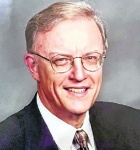
John N. Stumpf, MD '63
John N. Stumpf, MD, FACS, died on August 4, 2022 in Memphis, TN. Dr. Stumpf graduated from the University of Buffalo Medical School Class of 1963, and was a prominent General Surgeon for 42 years in Buffalo, NY and later in Naples, FL. He was the recipient of the Roche Award in medical school and a member of Alpha Omega Alpha Medical Honor Society. In addition to being a Fellow in the American College of Surgeons, he was an attending physician at several hospitals and served on many committees. He will be remembered for his gift of caring and his gentle bedside manner. He was active in his church, serving as a Board Member and Deacon.
C. John Abeyounis, PhD ’65, professor emeritus of microbiology, died June 14, 2018, four years after being diagnosed with frontal-lobe dementia. A native of North Carolina, Abeyounis completed his doctorate in microbiology at UB in 1965. After serving a postdoctoral fellowship at the Arthritis Foundation, he joined the medical school’s faculty as an instructor in the Department of Microbiology. In 1969 he was named an assistant professor and associate director of graduate studies, and in 1972 was named director. In 1977, Abeyounis was promoted to full professor and retired in 2000, but continued to teach non-science undergraduate students and clinical problem solving for medical students. Under his leadership the graduate program flourished and attracted students and fellows from all over the world. He was a highly respected mentor known for stressing rigor and reproducibility in research and as someone whom students could look to for professional guidance. Abeyounis’ research resulted in the publication of many papers, with later studies focusing on the then-emerging field of transplantation immunology.
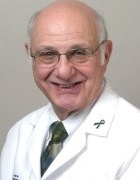
Rocco C. Venuto, MD ’67, professor of medicine, a former chief of the Division of Nephrology and a leading researcher on chronic kidney disease and treatment, died July 11, 2019 at his home in Williamsville, NY. He was 77.
A UB alumnus and physician with UBMD Internal Medicine who cared for generations of chronic kidney disease patients in Western New York, Venuto’s name had been synonymous with the field of nephrology in Buffalo and nationwide for half a century. He was seeing and caring for patients up until the day he died.
Venuto contributed significantly to research focused on how to improve care for kidney patients, whether they were being medically managed or were transplant recipients. An internationally recognized expert on hypertension in pregnancy, his research contributed significantly to the understanding of the pathophysiology of preeclampsia.
A tireless advocate for organ donation, in 2011 he received a Lifetime Achievement Award from Upstate New York Transplant Services, which he co-founded.
He and his UB colleagues collaborated on studies that revealed the inadequacy of early detection and treatment of chronic kidney disease, and he was an advocate for earlier diagnosis.
As division chief of nephrology, Venuto partnered with UB’s Institute for Healthcare Informatics in a major New York State-funded study of kidney disease that utilized big data in order to improve the care of chronic kidney disease patients in Western New York.
As medical director of renal transplant and director of the chronic kidney disease program at ECMC, he treated patients, as he put it, “with virtually every aspect of kidney disease,” from those undergoing dialysis to those receiving transplants. He also cared for high-risk pregnant women with renal dysfunction at Oishei Children’s Hospital.
He collaborated with researchers from ECMC and UB’s School of Pharmacy and Pharmaceutical Sciences to improve the clinical impact of medications used in transplant immunosuppression regimens.
To read the full obituary, go to medicine.buffalo.edu and search “Venuto.”
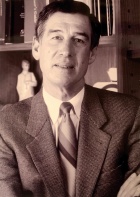
Robert Milch, MD '68
Robert A. Milch, MD ’68
—Surgeon and Co-Founder of Hospice & Palliative Care Buffalo
Robert A. Milch, MD ’68, longtime UB professor of surgery and co-founder of Hospice & Palliative Care Buffalo, died June 4, 2021 in Millard Fillmore Suburban Hospital in Amherst after a brief illness. He was 78.
A Buffalo native, Milch was the elder son of Mollie M. Milch, a former Buffalo School Board president, and Elmer Milch, MD, a former chief of surgery at Buffalo General Hospital. He graduated from Bennett High School in 1960 and completed a bachelor's degree in English from UB in 1964. Four years later, he graduated from the Jacobs School of Medicine and Biomedical Sciences, president of his class.
After completing his residency in general surgery, Milch spent two years as a surgeon at the U.S. Naval Hospital in Quantico, Va. He then began his career as a general and vascular surgeon with Buffalo Medical Group and joined the faculty at the Jacobs School, where he served for 25 years.
In 1978, Milch was asked to chair an annual conference with the American Cancer Society and Roswell Park Cancer Institute. He opted for something new, a session on hospice that involved doctors, nurses, social workers and chaplains.
Milch bet on the conference’s success, agreeing that he would cover the expenses if the event failed, but share in the receipts if it succeeded. More than 250 people attend, and Milch took the almost $4,000 proceedings, gave it to his Hospice Buffalo co-founder, Charlotte Shedd, and said, “Let’s start.”
Hospice Buffalo is believed to be the nation’s 11th organization of its kind. At first, the local group made do with a small second-floor office near All-High Stadium, and Milch helped broker a deal with then-Erie County Executive Ed Rutkowski to rent seven unused rooms in the Erie County Home & Infirmary in Alden for $1 a year. That became Hospice Buffalo’s first in-patient unit.
Over the past 43 years, the organization—now Hospice & Palliative Care Buffalo—has grown steadily, having served tens of thousands of Western New York patients and their families. In January 1993 at age 49, Milch gave up his surgical practice to become Hospice Buffalo’s full-time medical director.
Milch received numerous awards in his career. Two of his most cherished were being named Citizen of the Year by The Buffalo News in both 1993 and 1999. His other prized awards included the Hastings Center’s first-ever Cunniff-Dixon Physician Lifetime Achievement Award; the Jacob School’s Berkson Memorial Award for his compassionate patient care and excellent teaching; and the Jacobs School’s Class of 1981 dedicating its Iris yearbook to him.
Survivors include his wife of 54 years, the former Linda Newman; three daughters, Melissa, Jessica Taylor and Heidi Ann; one son, Michael; eight grandchildren; and his brother, David.
